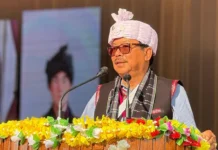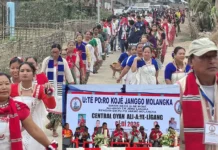[ Junroi Mamai ]
Despite the existence of strong laws, crimes against children in the state are rampant, while on the other hand the conviction rate in such cases remains low. There have been many instances where an accused charged under the Protection of Children from Sexual Offences (POCSO) Act managed to evade harsher punishment because of legal loopholes. Often it takes years of lengthy legal battles for aggrieved families to get justice, and the entire process dampens their already bruised morale.
In Arunachal Pradesh, where we have been witness to growing reports of sexual abuse of children, the state government in March last year approved stringent punishment for those involved in sexual crimes against children, as a deterrent. The government approved the death penalty for rape of girls under 12 years of age by passing criminal laws through the Arunachal Pradesh Amendment Bill, 2018, in the state assembly. The bill prescribes punishment for offences such as rape and gang rape of girls below 12 years of age to include the death penalty, as well as other punitive actions.
While the government’s move definitely deserves appreciation, it is, however, unfortunate that a lot still needs to be done to ensure prompt delivery of justice to the aggrieved. Not that the law is in any way inadequate, but the whole process of delivering justice is a long struggle in itself.
Starting with the trial, since everything depends on the evidence and statements gathered during the investigation, it is vital that the police department ensures that the police officers dealing with such cases are provided training on the POCSO Act, 2012, and its provisions in order to make them competent enough to take up such cases in the proper manner.
It has been evident from a number of cases in the past that the police officials failed to register cases of child abuse under proper sections of the POCSO Act, which later helped the accused evade stringent punishment for their crime(s).
Then there is the financial aspect of the trial process. Since the state-appointed counsels in such cases are already burdened with hordes of other cases, there is obvious delay in the trial process, which often leaves the aggrieved party to opt for their own counsel. Although there are provisions under the legal aid services to provide free legal assistance to those who cannot afford lawyers, most of the people are still unaware of the facility. A proper knowledge of all the provisions under the legal aid services is a must in such cases, and there is need for creating more awareness regarding this.
Apart from all these factors which impede the justice delivery process, there are other issues which the aggrieved parties also have had to endure. Often they are pressurized against pursuing a case, especially if the accused is a strong and influential member of the society. Threats are made, and sometimes social boycott of the aggrieved family is used as a tactic to prevent delivery of justice, which is no doubt reprehensible and deserves strong condemnation from all sections of the society.
Whoever be the person involved in such crimes, irrespective of their status, should be dealt the strictest punishment as per the laws. And, although an effective and strong law is vital, there is also the need to fast-track the justice delivery process, so that those who are affected are delivered justice without any unnecessary delay.




